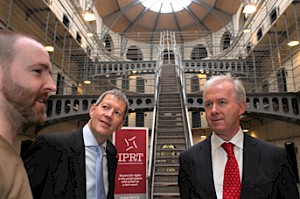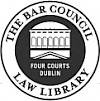IPRT Annual Lecture 2012: 'Sentencing Guidelines – the work of the Sentencing Council’
20th September 2012
 On Thursday 20th September, 2012 the Irish Penal
Reform Trust held its Annual Lecture, presented by the Honourable
Mr. Justice Colman Treacy of the High Court of England & Wales, on the work of the Sentencing Council of England and Wales, and sentencing guidelines. The Hon. Mr Justice Paul McDermott chaired the event, which was very well attended. The event took place in Kilmainham Gaol, Dublin 8.
On Thursday 20th September, 2012 the Irish Penal
Reform Trust held its Annual Lecture, presented by the Honourable
Mr. Justice Colman Treacy of the High Court of England & Wales, on the work of the Sentencing Council of England and Wales, and sentencing guidelines. The Hon. Mr Justice Paul McDermott chaired the event, which was very well attended. The event took place in Kilmainham Gaol, Dublin 8.
[Photo: The Hon. Mr Justice Colman Treacy and the Hon. Mr Paul McDermott with Niall Bergin, OPW (left of frame) at the Irish Penal Reform Trust Annual Lecture 2012 which took place Thursday 20th September, 2012 in Kilmainham Gaol. Credit: Derek Speirs]
Papers presented at the event are available here.
This event was kindly sponsored by KOD/Lyons Solicitors. For more information, see: www.kodlyons.ie
A drinks reception, sponsored by the Bar Council of Ireland, followed the event.


About the speakers:
Sir Colman Maurice Treacy, The Hon. Mr Justice Treacy was called to the Bar in 1971. He practised from chambers in Birmingham and was head of chambers from 1994 to 2000. He was appointed Queen’s Counsel in 1990, a Recorder in 1991 and to the High Court Bench in 2002. He was Presiding Judge on the midland circuit from 2006 to 2009. As a High Court Judge he has sat in the Court of Appeal Criminal Division, the Divisional Court, the Queen’s Bench Division, and the Administrative Court and is a Visitor to the Inns of Court. In July 2012, the Queen approved Judge Treacy's appointment as a Lord Justice of Appeal to take effect from October.
The event was chaired by The Hon. Mr. Justice Paul McDermott, Judge of the Irish High Court. Judge McDermott was educated at University College Dublin and King’s Inns and called to the Bar in 1980 and to the Inner Bar in 1999. He has published a textbook on Prison Law (1981) (with Raymond Byrne and Gerard Hogan) and acted as consultant editor of Martin McDonnell’s Misuse of Drugs – Criminal Offences and Penalties (2010). He also served as Chair of the Expert Group to advise on Article 13 of the European Convention on Human Rights. He was appointed to the High Court in May 2012.
About the Sentencing Council | sentencingcouncil.judiciary.gov.uk
The Sentencing Council for England and Wales promotes greater consistency in sentencing, whilst maintaining the independence of the judiciary. The Council produces guidelines on sentencing for the judiciary and aims to increase public understanding of sentencing. The Sentencing Council is an independent, non-departmental public body of the Ministry of Justice.
The Sentencing Council has responsibility for:
- developing sentencing guidelines and monitoring their use;
- assessing the impact of guidelines on sentencing practice. It may also be required to consider the impact of policy and legislative proposals relating to sentencing, when requested by the Government; and
- promoting awareness amongst the public regarding the realities of sentencing and publishing information regarding sentencing practice in Magistrates’ and Crown courts.
In addition to the functions above, the Council must:
- consider the impact of sentencing decisions on victims;
- monitor the application of the guidelines, better to predict the effect of them; and
- play a greater part in promoting understanding of, and increasing public confidence in, sentencing and the criminal justice system.




